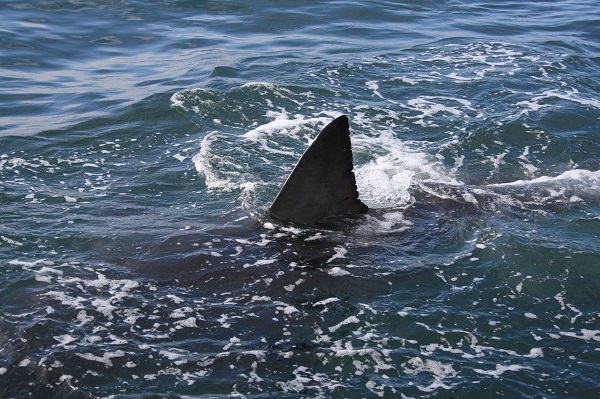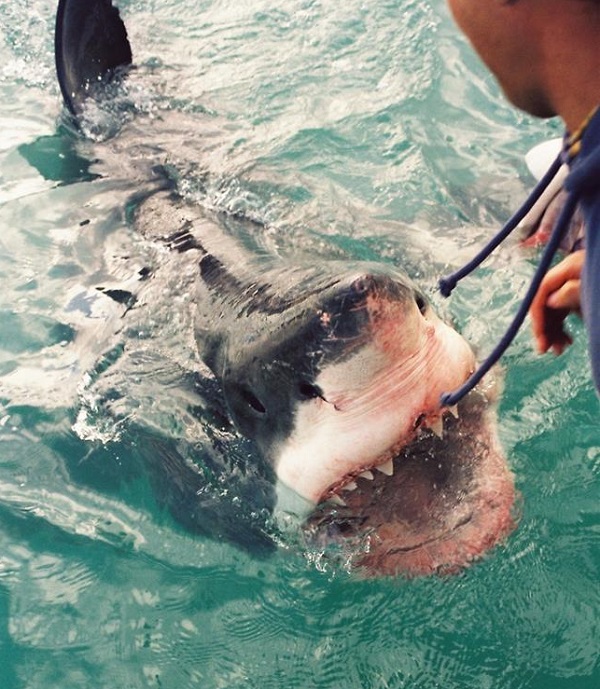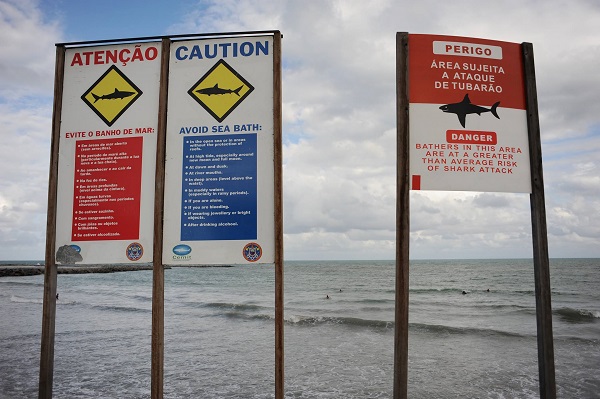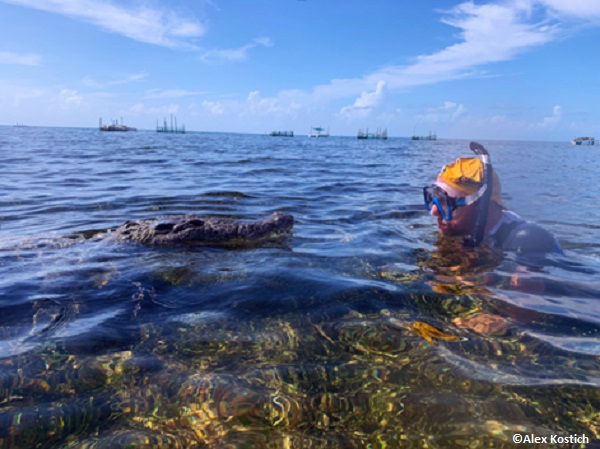Have you ever wondered why we are afraid of sharks?
“Shark!” No other cry for help triggers such an anxiety like the warning of the sinister predator. If you call “Help!” in the city at night, hardly anyone will pay attention. Usually you’re waiting in vain for helpers and civil courage. Even the distress call “Fire, Fire!” won’t rouse much attention. Most people will just give you a brief look and move on. But if you shout “Shark!” on a crowded beach, all hell will break lose within seconds. Why?

Each year, more people die from dog bites, bee stings or by drowning than from shark attacks.
You have a 1 in 3,748,067 annual risk of dying from a shark attack in your lifetime, according to International Shark Attack File (ISAF) data.
Lightning? A 1 in 79,746 risk of death. Cancer? A 1 in 7 chance. Heart disease? That’s a 1 in 5 chance. So, what is it about sharks that scares the heebie-jeebies out of us?
The Apex Predator, as sharks are called by experts, is at the top of the food chain. Even before “Jaws,” sharks symbolized pure evil, but the movie made everyone panic.
John Williams needed only two main notes in his soundtrack. Nothing more was necessary, even after 42 years, to give us goose bumps all over. E and F. Again, and again.
It’s similar to Pavlov’s dog and the bell. The Russian physiologist experiments with dogs demonstrated that our behavior can be changed using conditioning.
The “Jaws” theme is an acoustic alarm signal we automatically connect with a special feeling: Fear.

Steven Spielberg, a 27-year-old director, produced a timeless masterpiece by playing with our primal fears. He depicted the animal with a lot of aggressiveness, strength and even human intelligence. The shark is not only eating us, it is hunting us!
The thought of being reduced to flesh and protein is hard to comprehend for modern people.
We sailed the seven seas, we flew to the moon and now we’re just human prey? Thus, Spielberg formed an unprecedented horror movie about a serial killer with teeth. The result: Three Oscars, a Golden Globe and a Grammy! And millions of swimmers developed a bad feeling in the stomach when entering the sea.
But that’s nothing new. As early as 492 B.C., the scientist Herodotus spoke of huge monsters which made the coast of Greece unsafe. The reactions were fear and terror in the seafaring population. Even then, the shark was regarded as a primitive, brainless, man-eating and ship-tracking feeding machine that was to be eradicated from the face of the earth.” That view was primarily based on the fact that sailors were watching sharks devouring corpses that were thrown overboard, falsely referred to living people.
In 1776, the British naturalist and ichthyologist Thomas Pennant wrote in his four-volume British Zoology about sharks: “They are the horror of all seafarers in hot climates, where they continually encircle the ships in anticipation of what is falling overboard; a man to whom this misfortune follows is inevitably lost; you can see the sharks shooting at him like a gudgeon on a worm . . . ”
No other animal triggers such deep-rooted primal fears like the shark. Why?

One reason is certainly the imagination of being eaten alive. The anxiety that we have inherited from our cave-dwelling ancestors gives civilized people a real shock. Even lions, tigers and bears kill and eat people if they have the chance.
But the fear of sharks surpasses fear of the land-living predators many times over. Why? It’s quite simple. Lions, tigers and bears are cuddly and sweet as cubs, and appear as stuffed toys in every child‘s room. It is only when they are grown that they can become dangerous to people.
Lions, tigers and bears are well known animals, and there are countless nature documentaries on TV about them. But, the shark still remains a mystery to us. As a baby, he is anything but sweet. He already has the same sharp teeth as his adult parent. One additional shortcoming the shark has compared to land animals: There is no word to represent the vocalization a shark, or any fish, makes.
You cannot read its face. You cannot determine whether it is aggressive or in a good mood or harmless. The characteristic makes sharks appear soulless and evil, but more importantly, we can see animals on land from a distance. Unlike the shark.
The psychological aspect behind the shark hysteria is our innate fear of the unknown, which we have also inherited from our original ancestors. At that time, in dark times, death could lie behind every bush, behind every shadow. The sea bore a special danger, for no one could swim.
Mankind is so misplaced in the ocean. It is not surprising that we fear most creatures from the sea. When we go into the sea, we are truly in a different world. Even with good diving equipment, we remain intruders and silent observers. Being aware and being on guard saved our ancestors from being eaten alive.
Panic and anxiety have therefore played an important role in human survival. People are afraid of what we do not know, and of all the great predators on this planet, we probably know the least about the shark.

Despite our superior technology and science, the best word with which we can describe a shark is still “unpredictable.” The fear of sharks is so widespread, the phobia has a name: Galeophobia.
Books and web pages that deal with shark attacks have adventurous names such as “The Fear Beneath,” “The Devil’s Teeth,” “Deep Dark Water,” and “Swim at your own Risk,” and contain a mixture of fear and fascination which emanates from the world’s largest predatory fish.
But where does this deep-seated fear come from? The fear which torments almost everyone?
After all, only a few can claim to have ever been attacked. The data from ISAF is ample proof: Between the years 1580 and 2016, the scientists recorded 2,778 unprovoked shark attacks of which 497 were deadly.
This concludes Part One of The Fear Beneath: Why are we afraid of sharks?
The Fear Beneath: Why we are afraid of sharks Part Two is now available
Be sure to check out Scuba diving on Tiger Beach, Bahamas and How Cage Diving with Great White Sharks began.
Christian Kemper is a TV journalist from Germany. He has been diving with and studying sharks for more than 20 years. He has written two books about shark attacks and one book about crocodiles. He is a freelance writer for three of the largest diving magazines in Germany.
The cover of Strange Pool Friends by Christian Kemper
You can find his German language book Strange Pool Friends on Amazon and at https://tredition.de/.


